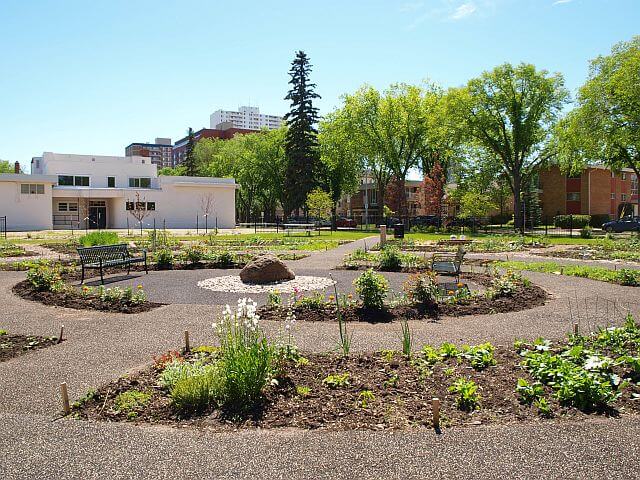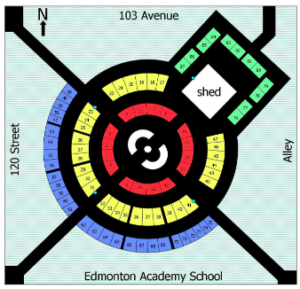Want to become a member of (and get a plot at) Peace Garden Park?
Garden plots are assigned on a first come, first served basis to Wîhkwêntôwin residents. Gardeners who have tended a plot and completed the previous season in good standing will be granted their plot again for the following year.
Any open plots are offered to people from the wait list in order of date they made their initial plot request. To sign up to our garden plot waitlist, please complete this form.
Please review the FAQs below prior to completing the application. Our wait list can be 2+ years for a plot. To contact the Peace Garden Park Committee, email info@wclyeg.com.

Wîhkwêntôwin currently has one community garden named Peace Garden Park located at 10259-120 Street. It provides an opportunity for residents to enjoy the health, social, economic and environmental benefits of local, organic gardening. No chemical fertilizers, pesticides, herbicides, etc. are used at the community garden.
The name Peace Garden Park was chosen because 103 avenue was formerly known as Peace Avenue. ‘Garden Park’ reflects the unique dual purpose of this space as both a community garden (maintained by the garden members on behalf of Wîhkwêntôwin Community League) and public park space (maintained by the City of Edmonton Parks department).
Gardening at Peace Garden Park FAQ
What is a community garden?
A community garden is a group of people who garden in individual plots and/or common areas. Community gardens are created for a variety of reasons. Primarily, community gardeners grow for food self-reliance, for physical activity, and for social interaction.
Community gardens serve a community of diversity: the elderly, teens, low income, newly arrived immigrants, young children, and people with a variety of abilities. Quality of life is enhanced for all; influencing the individual, the family and the community in many ways. On a personal level, individuals are healthier with access to organic fruits and vegetables, are physically more active, and enjoy the benefits of social interactions with their neighbours. Depressed, isolated, or bored individuals become healthy community leaders. Families learn to work together to increase their food security. Recent immigrants to Canada feel more at home and more engaged with their neighbours. Food is often grown for the Food Bank.
Physical change takes place within the community landscape. Unsightly abandoned lots are turned into safe and vibrant community gathering places. Monotonous lawns are filled with edible and decorative plant species which increase biodiversity. Neighbourhoods are greener, and have better weed and litter control.
In Edmonton, most community gardens are operated in partnership with a not-for-profit entity such as a municipal department, social service agency, church or co-operative housing complex. For more information about community gardens and to find a garden in Edmonton near you, please see the City of Edmonton community garden page.
What are some Peace Garden Park Quick Facts?
- 1/2 acre plot of land available to the Wîhkwêntôwin Community for a garden in 2009
- 87 garden plots including 12 raised cedar box plots
- $50/year garden plot fee + Wîhkwêntôwin Community League membership (Currently, OCL membership is free of charge!)

Who organizes/coordinates the garden and gardeners?
The Garden Director is elected via the Annual General Meeting of the Wîhkwêntôwin Community League for a 2-year term. The Garden Committee is elected at the Garden’s Annual General Meeting, which typically takes place in November at the end of the season.
What is required of garden members?
All garden members are required to sign a garden contract at the beginning of each year that lays out the expectations of all members. See the current Peace Garden Park contract (print on 8″x14″ page) for all activities garden members are expected to commit to each season.
How can I grow food elsewhere in Wîhkwêntôwin?
There are many sites available in Edmonton on which to build community gardens, including private and public land. If you want to develop or expand a community garden project on City of Edmonton parkland, you will need to follow the Community Garden Development Process Flowchart which outlines the main steps and supports available to complete this process.
If you need more information on starting a garden project in Edmonton, contact your Neighbourhood Resource Coordinator by calling 311 or send an email to the Community Greening Coordinator.
How do I grow food in such a small space?
The City of Edmonton and Sustainable Food Edmonton provide a great starting place for new gardeners to learn more about cultivating food in urban spaces. If you want to take your learning to the next level, the University of Alberta Botanic Club offers a Master Gardener certification program.
